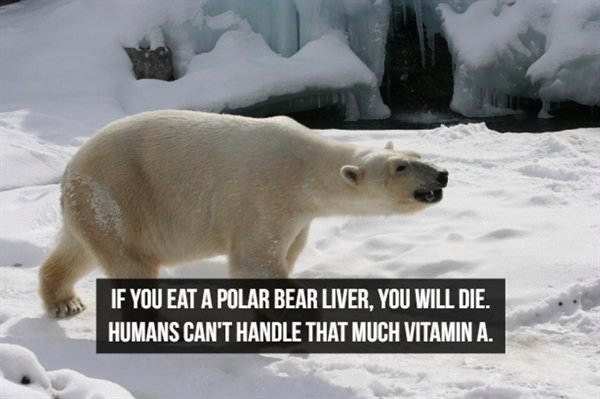If you eat a polar bear s liver you will die of a vitamin a overdose

Eating a Polar Bear’s Liver: The Dangers of Vitamin A Overdose

Polar bears are majestic and fascinating creatures that inhabit the icy regions of the Arctic. Known for their strength and resilience, these apex predators have adapted to survive in extreme conditions. However, there is one aspect of the polar bear that may pose a serious threat to humans – its liver.
According to a well-known fact, if you eat a polar bear’s liver, you will die of a vitamin A overdose. Is this claim just a myth, or is there some truth behind it? Let’s delve deeper into the subject to uncover the reality.
The liver of a polar bear is indeed incredibly rich in vitamin A. In fact, it contains such high levels of this essential nutrient that consuming it can have fatal consequences. To put things into perspective, the liver of a single polar bear can contain enough vitamin A to cause acute toxicity in a human adult.

Vitamin A, also known as retinol, is important for various bodily functions, including vision, immune system health, and cell growth. However, too much vitamin A can lead to hypervitaminosis A, a condition characterized by an excess of the vitamin in the body.
When consumed in excessive amounts, vitamin A accumulates in the liver, leading to a condition called acute vitamin A toxicity. This can cause a range of severe symptoms, including nausea, dizziness, fatigue, dry skin, hair loss, and even liver damage. In extreme cases, it can even be fatal.
It is worth noting that vitamin A toxicity is not exclusive to polar bear livers. In fact, it can occur in any situation where excessive amounts of vitamin A are consumed. However, due to the extraordinarily high levels of vitamin A present in polar bear livers, the risk of overdosing is significantly higher.
While the idea of consuming a polar bear’s liver may seem far-fetched to most people, it is essential to raise awareness about the potential dangers associated with it. As tempting as it may be to seek out such a unique delicacy, the risks clearly outweigh any potential benefits.
In conclusion, if you eat a polar bear’s liver, you are indeed at risk of a vitamin A overdose. The extremely high levels of this nutrient in the liver can lead to acute vitamin A toxicity, a condition that can have severe and even fatal consequences. It is crucial to prioritize our health and well-being and avoid engaging in activities that pose unnecessary dangers.
Source: “The Perils of Eating Polar Bear” - Anchorage Daily News
Related Posts
Quick Links
Legal Stuff

